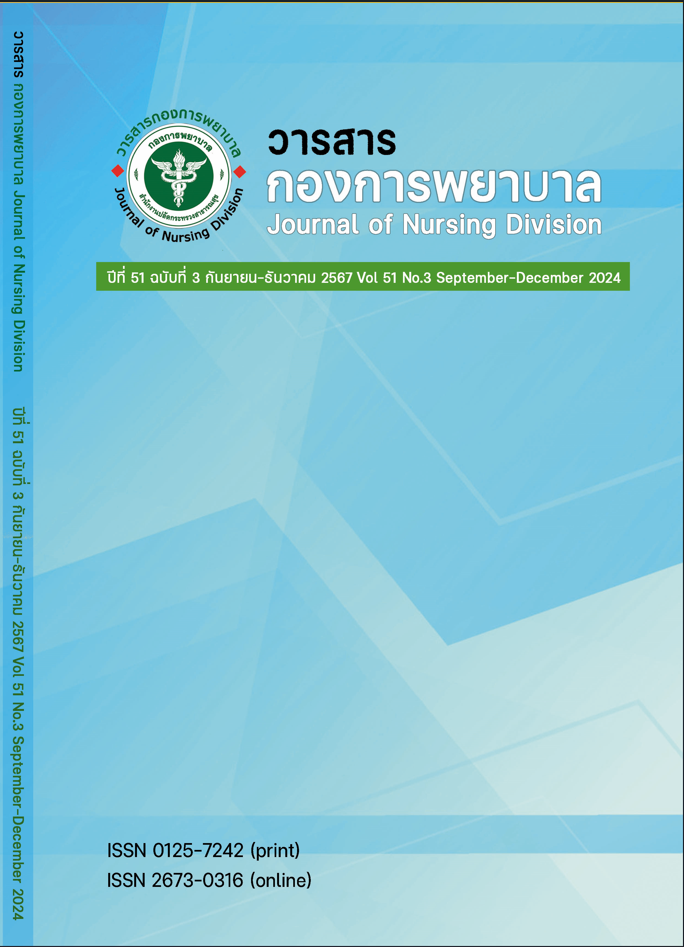ปัจจัยที่มีผลต่อพฤติกรรมการเลี้ยงลูกด้วยนมแม่ของมารดาหลังคลอดบุตรคนแรก
Main Article Content
บทคัดย่อ
บทคัดย่อ
การวิจัยเชิงพรรณา มีวัตถุประสงค์ เพื่อศึกษาพฤติกรรมและปัจจัยที่มีผลต่อพฤติกรรมการเลี้ยงลูกด้วยนมแม่ของมารดาหลังคลอดบุตรคนแรก กลุ่มตัวอย่าง คือ มารดาหลังคลอดครรภ์แรก จำนวน 88 คนที่มาตรวจตามนัด 6 สัปดาห์ เครื่องมือที่ใช้ในการวิจัย ได้แก่ แบบสอบถามความรู้ในการเลี้ยงลูกด้วยนมแม่ มีค่า KR-20 เท่ากับ .77 แบบสอบถามทัศนคติในการเลี้ยงลูกด้วยนมแม่ แบบสอบถามสมรรถนะแห่งตนในการเลี้ยงลูกด้วยนมแม่ และแบบสอบถามพฤติกรรมการเลี้ยงลูกด้วยนมแม่ โดยมีค่าสัมประสิทธิ์แอลฟ่าของครอนบาค เท่ากับ .79, .80 และ .82 ตามลำดับ วิเคราะห์ข้อมูลด้วยสถิติพรรณนา และสมการถดถอยพหุคูณ
ผลการวิจัย พบว่า กลุ่มตัวอย่างมีพฤติกรรมการเลี้ยงลูกด้วยนมแม่ อยู่ในระดับดี ร้อยละ 51.13 ความรู้ ทัศนคติ และสมรรถนะแห่งตนในการเลี้ยงลูกด้วยนมแม่ มีความสัมพันธ์ในระดับปานกลางกับพฤติกรรมการเลี้ยงลูกด้วยนมแม่ของมารดาหลังคลอดบุตรคนแรก อย่างมีนัยสำคัญทางสถิติ (r .407, .502, .600 ตามลำดับ, p < .01) ความรู้ ทัศนคติ และสมรรถนะแห่งตนในการเลี้ยงลูกด้วยนมแม่ สามารถร่วมกันทำนายพฤติกรรมการเลี้ยงลูกด้วยนมแม่ของมารดาหลังคลอดบุตรคนแรก ได้ร้อยละ 44.80 ( R2 .448, p < .01) ดังนั้น พยาบาลห้องคลอดและหลังคลอดควรส่งเสริมความรู้ ทัศนคติ และเสริมสร้างสมรรถนะแห่งตนในการเลี้ยงลูกด้วยนมแม่ให้กับมารดาตั้งแต่ระยะก่อนคลอด เพื่อกระตุ้นและให้มารดาหลังคลอดบุตรคนแรกมีความมั่นใจและตั้งใจที่จะเลี้ยงลูกด้วยนมแม่
Article Details

อนุญาตภายใต้เงื่อนไข Creative Commons Attribution-NonCommercial-NoDerivatives 4.0 International License.
เอกสารอ้างอิง
References
Ip S, Chung M, Raman G, Chew P, Magula N, DeVine D, et al. Breastfeeding and maternal and infant health outcomes in developed countries. Evid Rep Technol Assess.2007;1–186.
Bernardo H, Cesar V, World Health Organization. Long-term effects of breastfeeding: a systematic review. World Health Organization; 2013.
Qiao J, Dai LJ, Zhang Q, Ouyang YQ. A meta-analysis of the association between breastfeeding and early childhood obesity. J Pediatr Nurs.2020;53:57–66.
World Health Organization, United Nations Children’s Fund. Global nutrition targets 2025: breastfeeding policy brief (WHO/NMH/NHD/14.7). Geneva: World Health Organization;2023.
National Statistical Office of Thailand. Thailand multiple indicator cluster survey 2022.(Internet). (cite 2023, July 12). Available from: https://drive.google.com/drive/u/0/folders/1vZmtPTZvY6QtEM pcWU9BZhIcFYlYqIyK. Thai.
Strategy and Planning Division, Ministry of Public Health. Public Health Statistics A.D. 2021. Nonthaburi: Ministry of Public Health; 2022. Thai.
Arissara Sawatpanich, Susanha Yimyam Nonglak, Nonglak ChaloumsukYimyam. Factors influencing exclusive breastfeeding at discharge among first-time mothers undergoing cesarean section. Nursing Journal.2019;46(3):219 – 31. Thai.
Nattaphan P. Factors affecting breast feeding and infant formular feeding. Master of Management Degree College of Management. Bangkok: Mahidol University; 2014. Thai.
Chanatsikan Noiwech, Krauwan Nitisiri, Suwimon Preesong. Factors affecting breastfeeding behavior among postpartum mother at Dangchang Hospital. JHNUBU. 2024;3(1):15-27. Thai.
Atcharobon Sangprasert, Pinkaew Choteamnuay. Factors influencing of exclusive breastfeeding intention through at least 6 months among mothers with emergency cesarean section. Region 4-5 Medical Journal. 2023; 42(4): 541-51. Thai.
Bloom, S.B. Taxonomy of education objectives, head book I: Cognitive domain. New York: David Mckay;1975.
Bandura A. Self-efficacy: Toward a unifying theory of behavioral change. Psychological 1977; 84 (2):191–215. https:// https://doi.org/10.1037/0033-295X.84.2.191.
Burns N, Grove, SK. The practice of nursing research: Conduct, critique, & utilization (5th ed.) Philadelphia: W.B. Saunders; 2005.
Nopparat Tharana, Rattanaporn Tanasirijiranon. Effects of enhancing self-efficacy program on perceive self-efficacy, knowledge and satisfaction in breastfeeding among first-time postpartum mothers. Chaing Mai: Payap University; 2016. Thai.
Pornpavee Vataya. Media exposure, knowledge and attitudes about breastfeeding of working pregnant women using service at public center in Bangkok Metropolitan areas. Master of communication art. Bangkkok: Huachiew Chalermprakiet University; 2014. Thai.
Natthaporn C. Factors predicting behaviors for breastfeeding postpartum women in Wachirabaramee distric Phichit Province. Master Public Health. Phitsanulok: Naresuan University; 2017.Thai.
Maleewan Lertsakornsiri, Saly Saiba. The relationship between self-efficacy, self-esteem, attitude toward breastfeeding and breastfeeding behaviors in the first-time teenage postpartum mothers. Thai J Nurs. 2019; 68(1):29-38. Thai.
Wu D. S, Hu, Jie, McCoy, Thomas P, Efird J. T. The effects of a breastfeeding self-efficacy intervention on short-term breastfeeding outcomes among primiparous mothers in Wuhan, China. J Adv Nurs. 2014;70(8):1867-79.
Nachaphat Jeenlakroy, Thakonrat Nhoorerk, Ploypailpn Masuk Kamphaengjind, Chutima Booranatanit. Factors Influencing Exclusive Breastfeeding Intention in Mothers of Infants Are Cared for in The Nursery Unit Immediately After Birth. Journal of Nursing and Health Science Research 2024; 16(1): 1-17. Thai.
Lakkhana Chaiyanak. Factors influencing breast feeding behaviors of postpartum adolescent mothers in Maharat Nakhonratchasima Hospital. Nakhonratchasima: Suranaree University of Technology; 2015. Thai.


